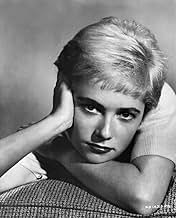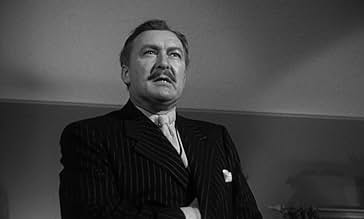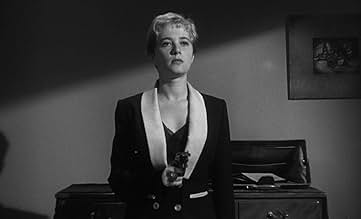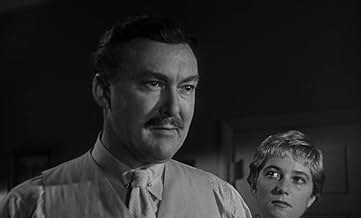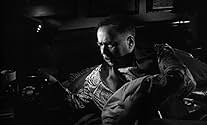CALIFICACIÓN DE IMDb
7.5/10
23 k
TU CALIFICACIÓN
Una autoestopista para a Mike Hammer y lo envuelve en un torbellino de intriga.Una autoestopista para a Mike Hammer y lo envuelve en un torbellino de intriga.Una autoestopista para a Mike Hammer y lo envuelve en un torbellino de intriga.
- Dirección
- Guionistas
- Elenco
- Premios
- 1 premio ganado y 1 nominación en total
Marian Carr
- Friday
- (as Marion Carr)
Mady Comfort
- Nightclub Singer
- (as Madi Comfort)
- Dirección
- Guionistas
- Todo el elenco y el equipo
- Producción, taquilla y más en IMDbPro
Opiniones destacadas
Man, I saw this movie for the first time a few years ago and I still don't know what to think about it. Ralph Meeker as a fascistic Mike Hammer, a crazy hitch-hiker, an opera fan and a box that can destroy the world. I dunno.
From what I understand Alderitch (the director) hated Mikey Spillane's story (which was about a briefcase full of drugs or money or something else), thought Mike Hammer was an image of brutality and fascism and made a film that reflected it. He makes Hammer out to be some kind of sadist and makes the suitcase out be some kind of nuclear device. The movie turns from a simple detective story to some wierd-ass, sci-fi cold war parable.
It's sort of like the X-Files meets film-noir PI, or something to that effect.
All that being said, this is a GREAT film and is well worth watching by anyone who like apocalyptic film-noir (in fact, this may be the only film in that sub-genre). Anyone who is a fan of bizarre camera work, weird symbolism and a stranger storyline, should really check this out.
Observe the many bizarre inconsistencies (clocks that jump ahead and back, screams that don't jibe right with the soundtrack, camera angles that jump mysteriously) and keep in mind that these were INTENDED! When you get a feel for this film and start noticing what the director was attempting to do with this bizarre film I think that you will enjoy it even more. Truly a unique piece of film making.
From what I understand Alderitch (the director) hated Mikey Spillane's story (which was about a briefcase full of drugs or money or something else), thought Mike Hammer was an image of brutality and fascism and made a film that reflected it. He makes Hammer out to be some kind of sadist and makes the suitcase out be some kind of nuclear device. The movie turns from a simple detective story to some wierd-ass, sci-fi cold war parable.
It's sort of like the X-Files meets film-noir PI, or something to that effect.
All that being said, this is a GREAT film and is well worth watching by anyone who like apocalyptic film-noir (in fact, this may be the only film in that sub-genre). Anyone who is a fan of bizarre camera work, weird symbolism and a stranger storyline, should really check this out.
Observe the many bizarre inconsistencies (clocks that jump ahead and back, screams that don't jibe right with the soundtrack, camera angles that jump mysteriously) and keep in mind that these were INTENDED! When you get a feel for this film and start noticing what the director was attempting to do with this bizarre film I think that you will enjoy it even more. Truly a unique piece of film making.
"Kiss Me Deadly" had few similarities with Spillane's story about a gang of dope traffickers
Instead Aldrich reworks the plot so that the criminals are mixed up in the theft of priceless and high1y dangerous radioactive material which they are planning to smuggle to an unnamed power
The complicated story begins with Hammer picking up a scared girl on a lonely road at night and continues through the girl's subsequent death, a kidnapping and a series of very brutal killings
Spillane's Mike Hammer remains the ultimate in violent private eyes The killings seem to matter less than the sadism One scene in which Hammer deliberately breaks the irreplaceable records of an Italian opera lover in order to get the information he wants is more repellent than any of the murders in the film
Furious but stylish, "Kiss Me Deadly" is a film of great power and stays unique for its mixing of art and pulp fiction
Spillane's Mike Hammer remains the ultimate in violent private eyes The killings seem to matter less than the sadism One scene in which Hammer deliberately breaks the irreplaceable records of an Italian opera lover in order to get the information he wants is more repellent than any of the murders in the film
Furious but stylish, "Kiss Me Deadly" is a film of great power and stays unique for its mixing of art and pulp fiction
Robert Aldrich was a no-nonsense film director. When he undertook the direction of this film, little did he know it was going to become the extraordinary movie it turned out to be. The fame seems to have come by its discovery in France, as it usually is the case. Based on Mickey Spillane's novel and adapted by Al Bezzerides, the movie has an unique style and it's recommended viewing for fans of the film noir genre.
Right from the start, the film gets our imagination as we watch a young woman running along a California highway. That sequence proved Mr. Aldrich's ability to convey the idea of a disturbed young woman that seems to have escaped from a mental institution. The plot complicates itself as Hammer learns that Christine, the young woman, has died. He decides to investigate, which is what he does best.
Some excellent comments have been submitted to this forum, so we will not even try to expand in the action but will only emphasize in the tremendous visual style Mr. Aldrich added to the film, which seems to be its main attraction. For a fifty year old film, it still has a crisp look to it thanks to the impressive black and white cinematography of Ernest Lazlo, who had a keen eye to show us Hammer's world as he makes it come alive. The great musical score by Frank DeVol fits perfectly with the atmosphere of the L.A. of the fifties.
Ralph Meeker made an excellent contribution as Mike Hammer. He dominates the film with his presence. Albert Decker, Paul Stewart, Miriam Carr, Maxine Cooper, Fortuno Bonanova, and especially Cloris Leachman, in her screen debut, make this film the favorite it has become.
Fans of the genre can thank Mr. Aldrich for making a film that didn't pretend to be anything, yet has stayed as a favorite all these years.
Right from the start, the film gets our imagination as we watch a young woman running along a California highway. That sequence proved Mr. Aldrich's ability to convey the idea of a disturbed young woman that seems to have escaped from a mental institution. The plot complicates itself as Hammer learns that Christine, the young woman, has died. He decides to investigate, which is what he does best.
Some excellent comments have been submitted to this forum, so we will not even try to expand in the action but will only emphasize in the tremendous visual style Mr. Aldrich added to the film, which seems to be its main attraction. For a fifty year old film, it still has a crisp look to it thanks to the impressive black and white cinematography of Ernest Lazlo, who had a keen eye to show us Hammer's world as he makes it come alive. The great musical score by Frank DeVol fits perfectly with the atmosphere of the L.A. of the fifties.
Ralph Meeker made an excellent contribution as Mike Hammer. He dominates the film with his presence. Albert Decker, Paul Stewart, Miriam Carr, Maxine Cooper, Fortuno Bonanova, and especially Cloris Leachman, in her screen debut, make this film the favorite it has become.
Fans of the genre can thank Mr. Aldrich for making a film that didn't pretend to be anything, yet has stayed as a favorite all these years.
If The Maltese Falcon (1941) was the definitive true detective movie, The Big Sleep (1946) the definitive glamourized detective movie, and Chinatown (1974) the definitive allegorical detective movie, then Kiss Me Deadly is the definitive sleazy detective movie.
Mickey Spillane's sadistic private eye Mike Hammer, turned from successful private eye to sleazy bedroom dick, is the quintessential anti-hero, doing just about anything and everything wrong to get a piece of the pie that the characters call "The Big What's-it."
The movie survives by giving the usual Spillane buckets-of-blood story and its protagonist new dimensions. Right from the electric opening scene and the audacious opening credit sequence, the audience is drawn into Hammer's seedy world, where morality is suspended, and the credo of the end justifying the means dominates Hammer's actions. His reckless abandonment is almost never questionned and the film seems to understand his brutality as what he must do to get the job done in an equally brutal world.
Director Robert Aldrich observes all of it with an objective eye that neither glorifies nor condemns the action on-screen, letting the audience draw its own conclusions--even where the plot is concerned. The pace is unrelentless and the plot turns are never fully explained, forcing the audience to participate willingly in all that Hammer does to, hopefully, see the story through to its ending.
And what an ending! I'd de damned to a special place in Hell if I elaborated, so I'll just say that it's one of the greatest I've ever seen. That goes same for the movie itself, which is one of the most stylish, jarring and truly entertaining movies of its genre.
Mickey Spillane's sadistic private eye Mike Hammer, turned from successful private eye to sleazy bedroom dick, is the quintessential anti-hero, doing just about anything and everything wrong to get a piece of the pie that the characters call "The Big What's-it."
The movie survives by giving the usual Spillane buckets-of-blood story and its protagonist new dimensions. Right from the electric opening scene and the audacious opening credit sequence, the audience is drawn into Hammer's seedy world, where morality is suspended, and the credo of the end justifying the means dominates Hammer's actions. His reckless abandonment is almost never questionned and the film seems to understand his brutality as what he must do to get the job done in an equally brutal world.
Director Robert Aldrich observes all of it with an objective eye that neither glorifies nor condemns the action on-screen, letting the audience draw its own conclusions--even where the plot is concerned. The pace is unrelentless and the plot turns are never fully explained, forcing the audience to participate willingly in all that Hammer does to, hopefully, see the story through to its ending.
And what an ending! I'd de damned to a special place in Hell if I elaborated, so I'll just say that it's one of the greatest I've ever seen. That goes same for the movie itself, which is one of the most stylish, jarring and truly entertaining movies of its genre.
This late entry into the film noir genre has some harsh and memorable scenes and an ending unlike any other film noir. Of course, most of those weren't made during the A-Bomb scares of the mid 1950s, as this was.
The movie features a tough, no-nonsense Mike Hammer-like private eye, played well by Ralph Meeker, whose tough-guy dialog is a little dated but still fun to hear. This is one of those noirs in which everyone is a tough-talking, tough-acting mug and one never knows who to trust. Except for Cloris Leachman, who is only in the first quick (but haunting) opening scene, the females in here are unfamiliar actresses but people with interesting faces and personalities.
That opening with Leachman is a real attention-grabber and is one of the best starts I've ever seen in a crime movie. It's very creepy, as is the unique ending. I also appreciated the cinematography in here a lot more once the DVD was issued.
The movie features a tough, no-nonsense Mike Hammer-like private eye, played well by Ralph Meeker, whose tough-guy dialog is a little dated but still fun to hear. This is one of those noirs in which everyone is a tough-talking, tough-acting mug and one never knows who to trust. Except for Cloris Leachman, who is only in the first quick (but haunting) opening scene, the females in here are unfamiliar actresses but people with interesting faces and personalities.
That opening with Leachman is a real attention-grabber and is one of the best starts I've ever seen in a crime movie. It's very creepy, as is the unique ending. I also appreciated the cinematography in here a lot more once the DVD was issued.
¿Sabías que…?
- TriviaThe Kefauver Commission, a federal unit dedicated to investigating corrupting influences in the 1950s, singled this out as 1955's number one menace to American youth. Because of this, Robert Aldrich felt compelled to conduct a writing campaign for the free speech rights of independent filmmakers.
- ErroresAt the beginning, Christina (Cloris Leachman) is shown running at the side of the highway, but the shots of only her feet show her running along the painted center line of the highway.
- Citas
Mike Hammer: You're never around when I need you.
Velda: You never need me when I'm around.
- Créditos curiososThe opening credits scroll down instead of the usual up, resulting in needing to read them bottom to top.
- Versiones alternativasUntil 1997, all known copies in circulation of "Kiss Me Deadly" ended rather abruptly: the wounded Mike Hammer stumbling through the beach house looking for his partner Velda, and then there's a couple of brief shots of the house exploding and burning, with "The End" superimposed on the final shot. The music is cut off instead of fading out, and the screen turns black; it looks like Mike and Velda died in the blaze.
- ConexionesEdited into American Cinema: Film Noir (1995)
- Bandas sonorasRather Have the Blues
Sung by Nat 'King' Cole
Written by Frank De Vol (uncredited)
[Played on the car radio during the opening title card and credits]
Selecciones populares
Inicia sesión para calificar y agrega a la lista de videos para obtener recomendaciones personalizadas
- How long is Kiss Me Deadly?Con tecnología de Alexa
- Why are there two different endings?
- Which one is the original ending?
- What is the European ending?
Detalles
- Fecha de lanzamiento
- País de origen
- Idiomas
- También se conoce como
- Kiss Me Deadly
- Locaciones de filmación
- Clay Street, Bunker Hill, Downtown, Los Ángeles, California, Estados Unidos(Mike parks his Corvette and takes the back steps up to the Hillcrest Hotel)
- Productora
- Ver más créditos de la compañía en IMDbPro
Taquilla
- Presupuesto
- USD 410,000 (estimado)
- Total en EE. UU. y Canadá
- USD 726,000
- Total a nivel mundial
- USD 952,000
- Tiempo de ejecución1 hora 46 minutos
- Color
- Relación de aspecto
- 1.85 : 1
Contribuir a esta página
Sugiere una edición o agrega el contenido que falta

Principales brechas de datos
By what name was El beso mortal (1955) officially released in India in English?
Responda


